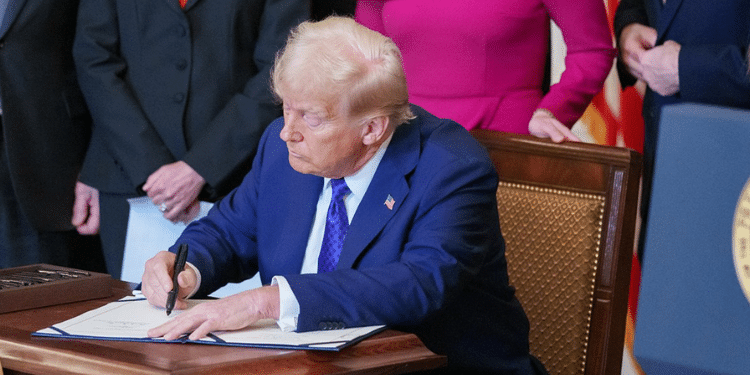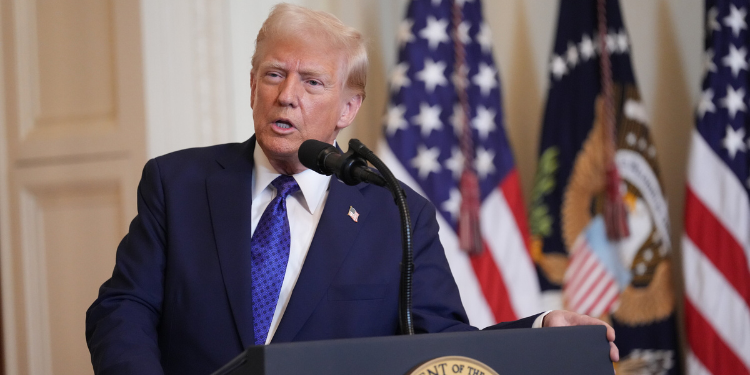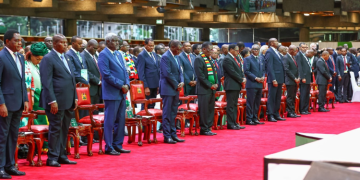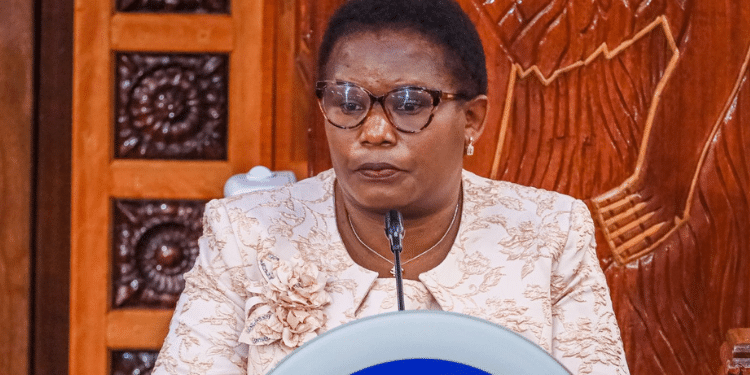The High Court has delivered its judgment in a case challenging the ouster of embattled Meru Governor Kawira Mwangaza.
Justice Bahati Mwamuye while delivering the ruling on Friday March 14 stated that the impeachment against Mwangaza should stand as it followed procedural fairness and constitutional requirements.
Mwamuye ruled that the senate’s impeachment process was procedurally sound and does not warrant judicial intervention on grounds of unfair hearing.
He further dismissed Mwangaza’s petition that claimed that the process was marred by chaos, and lack of evidence ruling that she had failed to substantiate those allegations.
“Consequently, and for the following reasons, this court finds and determines that:
a) The amended petition dated December 23, 2024, which is the subject of the proceedings herein, is found to be without merit and is dismissed accordingly.
b) The Gazette Notice Number 10351, Volume CXXVI, Number 130, dated August 20, 2024, published on August 21, 2024, and issued by the respondent, communicating the decision and/or resolution of the Senate to remove the petitioner from office as the governor of Meru County by way of impeachment, is affirmed for the purposes of these proceedings.
c) Consequent to a and b above, the subsequent constitutional and statutory actions are free to take place as per the applicable timelines.
d) Each party shall bear their own costs,” the court ruled.
Court Upholds Kawira Mwangaza’s Impeachment
Mwamuye stated that the court was satisfied that the charges laid before the senate and which were considered by the chamber in favor of impeachment were of a nature that meets the requirements of article 181 (1), clause one of the constitutions.
“The petitioner has not shown that the senate’s analysis of the applicable law and evidence was so profoundly incorrect that no reasonable quasi-judicial body properly applying its mind to the law and the facts would have arrived at that conclusion and thus warranting interference by this court,” Mwamuye noted.
Justice Mwamuye stated that gubernatorial impeachment is an invaluable safeguard against impunity and abuse of office that must be jealously protected.
He added that it must not be allowed to become an avenue for political proxy wars or to resurrect ballot box contestations that were determined by the electorate when it chose a particular candidate to hold the office of governor.
“In that regard, the Senate, as a national legislative body capable of rising above the county-level political fray, is uniquely placed to safeguard the sanctity, probity, and vitality of this very important accountability measure,” he added.
“Watering down impeachment, lowering its threshold too much, or allowing it to become a facade masking hidden political interests, risks eroding public confidence in the process.”
He added, ” Interventions by the courts come further down the impeachment path, and thus, it is the duty of the primary duty bearers—the concerned county assembly and, thereafter, the Senate—to ensure that impeachment remains as constitutionally envisaged.”
The court also declined to issue interim stay orders for Mwangaza to remain as the governor of Meru County and to stop the consequent actions that the judgment of this court has allowed from being implemented.
“I’m noting that our constitutional order gave the petitioner ample time to seek injunctive relief in other fora, and noting that this has been a prolonged litigation in which the petitioner has enjoyed interim relief since the 21st of August, 2024, with respect to a resolution of the Senate that has been found to be lawful by this court, I decline to grant the interim relief or stay sought orally,” Mwamuye noted.
Allegations Made by Mwangaza Dismissed
The court said it assessed the totality of the impeachment process and found that the Mwangaza was given ample opportunity to present her case and respond to allegations leveled against her.
“While the petitioner has pointed out certain aspects of the proceedings that she considers unfair, such as limited debate time, the opportunity to make a personal statement, the alleged chaotic nature of the proceedings, the timing of official communications, and the perceived haste in concluding the impeachment, none of these claims have been substantiated sufficiently to warrant a finding that a fair hearing rights were violated,” the ruling read further.
“The senate proceedings followed standard parliamentary procedure incorporating an opening statement, presentation of evidence, an opportunity for senators to ask questions, and a closing statement.”
Kawira Mwangaza, through her advocates Elias Mutuma and Elisha Ongoya, had moved to court seeking to uphold the decision of Meru voters who elected her over her opponents.
During the hearing, the court was told that the impeachment motion against her was not based on substance but was a scheme to remove her from office by any means.
Kawira argues that the impeachment process before the senate was marred by a series of constitutional violations, procedural defects, and contempt of court.
Kawira Mwangaza Arguments in Court
She asserted that the actions of the senate and the county assembly were not only unfair but also illegal, rendering the entire impeachment process null and void.
“The petitioner further contends that the senate acted in bad faith by continuing with the impeachment despite clear judicial directives,” read the court documents.
“Given these circumstances, the petitioner urges this court to quash the impeachment process, declare it unconstitutional, and up uphold her constitutional rights to due process and a fair hearing.”
Also Read: Public Service Board Clashes with Mwangaza Over Hiring
She maintained that the proceedings at the Senate violated her right to a fair hearing, as the environment was not conducive to impartial proceedings, and the decision had been pre-determined.
“The petitioner also argues that the impeachment process was fraught with procedural irregularities, which were acknowledged by some senators after the fact,” the documents read further.
“Several senators in media statements and parliamentary sessions admitted that the impeachment was unfair, unprocedural, and invalid.”
Also Read: Impeachment Motions Against Kawira Mwangaza’s CECMs Tabled Ahead of Ruling
How Mwangaza was Impeached
Mwangaza was impeached by the Senate in August 2024. On the first charge of gross violation of the Constitution and other laws, the Senate found her guilty, with 26 senators voting to confirm the charge, 4 voting against it, and 14 abstaining.
The second charge followed a similar pattern, with 26 senators voting in favor, 2 opposing, and 14 abstaining. The third charge, abuse of office, saw 27 senators voting to confirm the charge, 1 voting against it, and 14 abstaining.
Mwangaza subsequently sought court orders to allow her to continue serving the people of Meru County. In December 2024, the High Court extended orders blocking the Senate’s decision to impeach her.
High Court Judge Bahati Mwamuye ruled that Mwangaza’s application has met the threshold required for the extension of the orders.
“The respondent’s notice of motion is dismissed, ex-party orders are confirmed and extended for a period of 120 days and at that time she will continue to serve as the Governor,” Justice Mwamuye ruled.
Follow our WhatsApp Channel and join our WhatsApp Group for real-time news updates.












































































